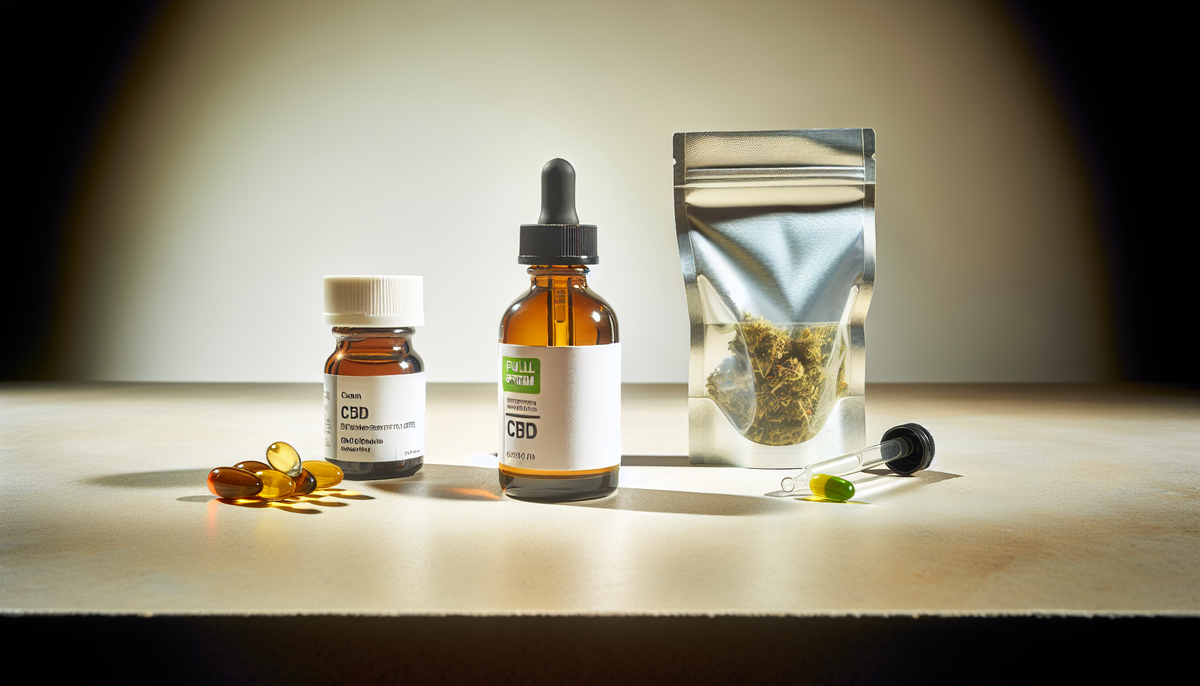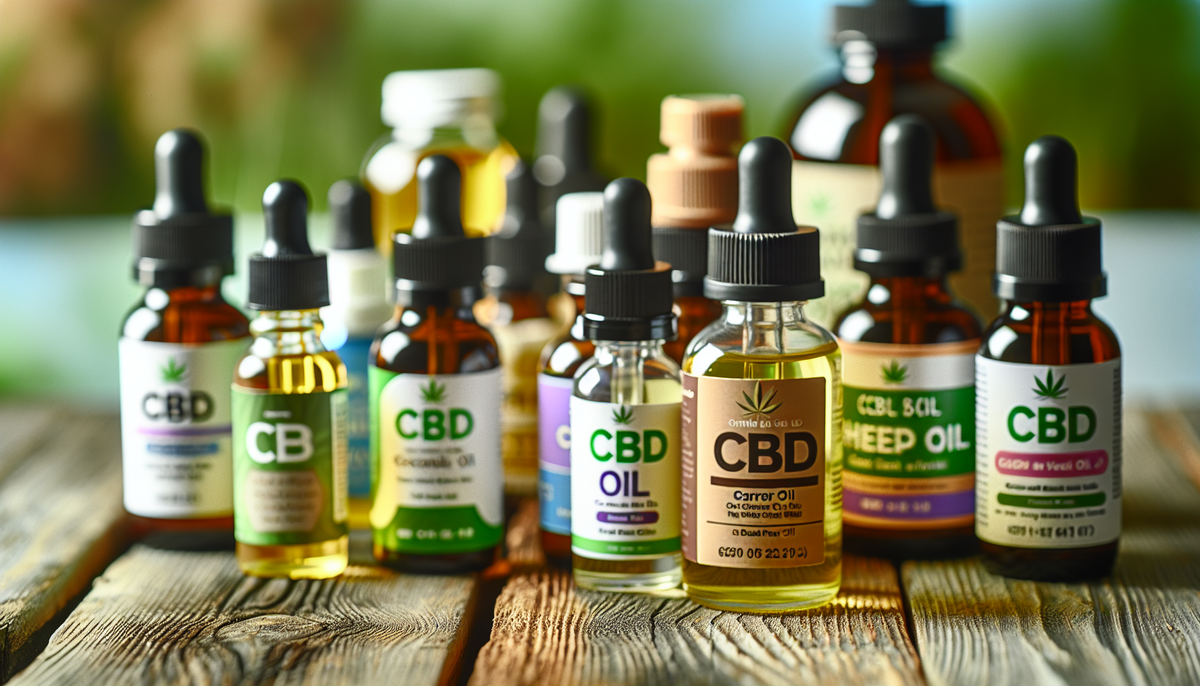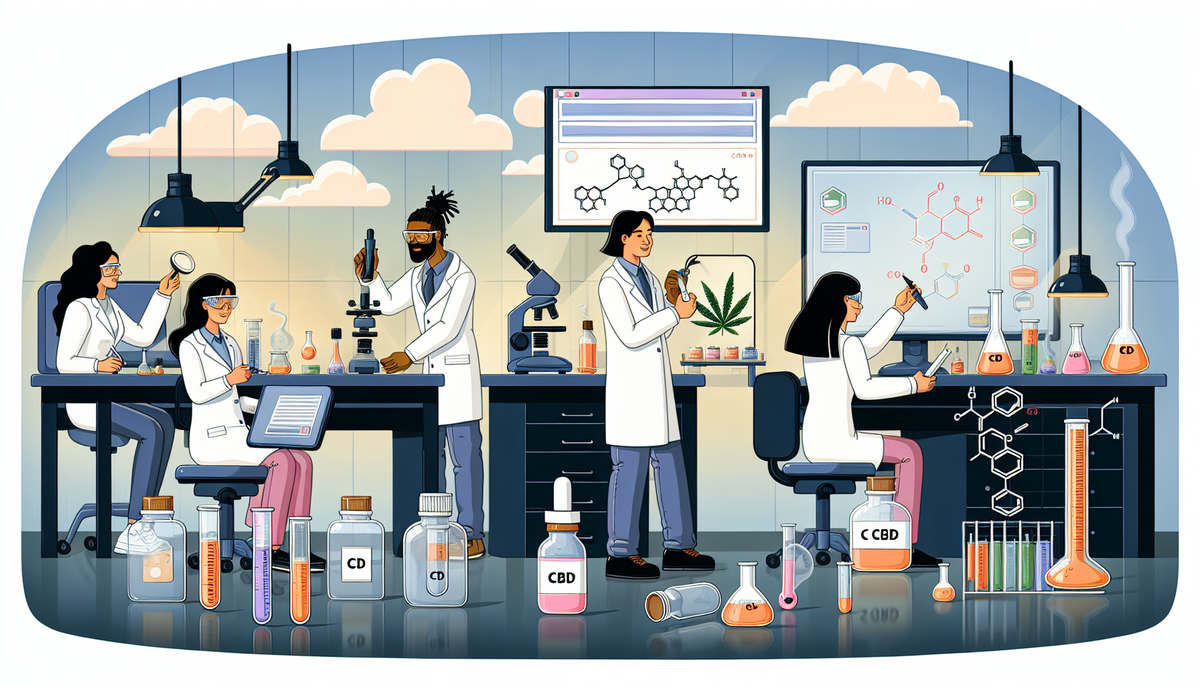Discover the Best CBD Product Types for Your Wellness Routine
Written by: Daniel Fayad, Subject Matter Expert and Website President
Published: March 15, 2024; Last updated: April 6, 2024
- 1. Key Takeaways
- 2. Understanding the Spectrum: A Guide to CBD Varieties
- 2.1 Broad Spectrum CBD: THC-Free Wellness
- 2.2 Pure Potency: The Simplicity of CBD Isolate
- 3. Delving into CBD Oil Products
- 3.1 The Role of Carrier Oils in CBD Absorption
- 3.2 Extraction Techniques and Their Impact on Quality
- 3.3 Measuring Up: Understanding CBD Potency
- 4. Beyond Oils: The Diversity of CBD Formulations
- 4.1 Edible Adventures: CBD Gummies and Capsules
- 4.2 Targeted Relief: Topical CBD Product Options
- 4.3 Inhalation Methods: Vaping and Smoking CBD
- 5. Navigating the Legal Landscape of CBD Products
- 6. The Intersection of CBD and Healthcare
- 7. Ensuring Quality and Safety When Choosing CBD
- 8. The Future of CBD: Emerging Trends and Innovations
- 9. Summary
- 10. Frequently Asked Questions
- 10.1 What are the 3 types of CBD?
- 10.2 Are there different types of CDB?
- 10.3 What are carrier oils and why are they important?
- 10.4 What are some potential side effects of CBD use?
- 10.5 How can I ensure the quality and safety of CBD products?
If you’re seeking clarity on CBD product types, this guide is your starting point. From full spectrum to isolate, we break down the options to match your wellness needs. You won’t find lofty claims here—just clear, concise information to aid your decision-making process.
Key Takeaways
CBD products come in various spectrums: full spectrum (includes all cannabis plant compounds and trace THC), broad-spectrum (THC-free but contains other compounds), and isolate (pure CBD without other compounds).
Consumers must consider factors such as the type of carrier oil, extraction methods, and product potency when selecting CBD oil products, with CO2 extraction viewed as the gold standard for quality.
The legality of CBD products is determined by their THC content and the regulations that vary between federal and state levels, requiring consumers to remain informed about the legal rules of their specific location.
Understanding the Spectrum: A Guide to CBD Varieties

The journey to understanding the different types of CBD begins by getting acquainted with three primary types: full-spectrum CBD, broad-spectrum CBD, and CBD isolate. These types primarily differ in their composition and the extraction process used to obtain them. CBD oil products, including full-spectrum CBD oil, broad-spectrum CBD oil, and CBD isolates, each offer unique benefits. Grasping these differences is key to making an informed decision when choosing from the variety of spectrum CBD oils available.
Full-spectrum CBD retains all the natural compounds found in the cannabis plant, including:
CBD
other cannabinoids
terpenes
trace amounts of THC
On the other hand, broad-spectrum CBD undergoes additional extraction to remove all THC, while retaining other plant compounds. CBD isolate, as the name suggests, is pure CBD without any other cannabinoids or plant compounds.
Why is this significant? Well, the presence or absence of these compounds can significantly impact the potential benefits of the respective CBD products. We’ll probe into this more deeply here.
Broad Spectrum CBD: THC-Free Wellness
If the presence of THC in full-spectrum CBD concerns you, broad-spectrum CBD may be your go-to option. Broad spectrum CBD:
Retains all the other beneficial compounds found in the cannabis plant
Has all THC removed
Provides the therapeutic benefits of cannabinoids without the intoxicating effects of THC
This makes it a perfect choice for those who want the therapeutic benefits of cannabinoids without the intoxicating effects of THC.
Furthermore, broad-spectrum CBD is an ideal choice for individuals who undergo regular drug testing, as it lacks THC, which is commonly screened for. Despite being free of THC, broad-spectrum CBD may still promote an “entourage effect” owing to the presence of multiple cannabinoids. Hence, if you’re seeking the synergistic effect of multiple cannabinoids without THC, broad-spectrum CBD products might be the ideal solution.
Pure Potency: The Simplicity of CBD Isolate
For those seeking the purest form of CBD, look no further than CBD isolate. CBD isolate is pure CBD, containing no other plant ingredients. It also does not contain THC or any other compounds found in the cannabis plant. This purity makes it an excellent option for individuals who want to use CBD without experiencing any psychoactive effects.
One notable advantage of CBD isolate is its economical nature. Since it’s the purest form of CBD available, it’s generally less expensive than full-spectrum and broad-spectrum CBD products, making it a budget-friendly choice for consumers. Furthermore, CBD isolate may be the most suitable option for individuals subject to drug testing, those with legal restrictions, or those requiring high doses of CBD without any other cannabinoids.
Delving into CBD Oil Products

Having navigated through the various types of CBD, we now turn our attention to the realm of CBD oil products. CBD oils are one of the most common ways to consume CBD, and their effectiveness and delivery are significantly influenced by carrier oils. CBD oils and tinctures differ primarily due to the carrier agents they contain, adding another layer of complexity to the process of choosing the right CBD product.
Understanding the role of carrier oils, the extraction techniques used to obtain CBD, and the potency measurements is crucial to making an informed decision. Each of these factors plays a significant role in determining the quality, safety, and effectiveness of CBD oil products. We’ll delve into each of these components.
The Role of Carrier Oils in CBD Absorption
Carrier oils are crucial for CBD products as they dissolve cannabinoid molecules, enhancing their absorption by the body and improving bioavailability. MCT oil, commonly derived from coconut or palm kernel oil, is the most prevalent carrier oil due to its rapid absorption and high saturated fat content, which aid in the dissolution of CBD.
The choice of carrier oil can significantly impact the bioavailability of CBD, which is crucial for its effectiveness. Carrier oils also:
Facilitate accurate dosing of CBD products
Offer a manageable measurement of the CBD-infused product compared to pure CBD
Support CBD’s potency and shelf-life by minimizing oxidation and preventing the active compounds from degradation.
Hence, when selecting a CBD oil product, make certain that the carrier oil is mentioned on the product’s ingredient label to ensure improved absorption and stability.
Extraction Techniques and Their Impact on Quality
The extraction technique used to obtain CBD significantly influences the purity, safety, and overall quality of CBD oil products. The supercritical CO2 extraction method, for instance, allows for efficient extraction of cannabinoids and terpenes without leaving solvent residues, thus preserving the purity of the CBD oil.
On the other hand, ethanol extraction is recognized as safe and avoids high-heat exposure, but solvent residue can pose risks. Moreover, petroleum-based solvents like butane and propane are highly toxic and may leave harmful residues. Hence, knowing the extraction methods applied is essential when selecting a high-quality CBD oil product.
Measuring Up: Understanding CBD Potency
CBD potency is another crucial factor to consider when selecting a CBD product. Potency is determined by the concentration of CBD in the product, which is measured in milligrams per serving. Product labels should clearly list the amount of CBD in milligrams for both the entire product and per serving size or dose to help consumers understand the concentration of CBD.
To accurately gauge the value of CBD products based on potency, consumers should look at the cost per milliliter or ounce as well as compare the CBD content per milliliter or ounce instead of just the total product size or price. This information aids consumers in finding a product that yields the desired effects and provides the best value for their money.
Beyond Oils: The Diversity of CBD Formulations

While CBD oil products are a popular choice, they are far from being the only way to consume CBD. The CBD market offers a diverse range of formulations beyond oils, including edibles, topicals, and inhalation methods. Each of these options offers unique benefits and can be more suitable depending on individual preferences and needs.
From gummies and capsules to lotions and vapes, the choice of CBD product you choose can significantly impact your CBD experience. Whether you’re looking for controlled dosing, targeted relief, or immediate results, there’s a CBD product out there that’s perfect for you. We’ll delve into these categories more intricately.
Edible Adventures: CBD Gummies and Capsules
CBD gummies and capsules are a popular choice among users thanks to their convenience and controlled dosing. These edible forms of CBD provide a fixed dose of CBD per serving, making it easy for users to know exactly how much CBD they are consuming. This convenience makes them an excellent option for on-the-go consumption without the need to measure out doses using a dropper.
However, bear in mind that the effects of CBD, when consumed in the form of CBD edibles, have a delayed onset as they must be processed by the digestive system prior to entering the bloodstream. Thus, while they offer convenience and controlled dosing, they may not be the best choice for those seeking immediate relief.
Additionally, absorption of CBD into the bloodstream is lower with edibles compared to sublingual or inhalation methods, affecting the overall bioavailability of the CBD.
Targeted Relief: Topical CBD Product Options
Topical CBD products, such as lotions, salves, ointments, and creams, offer targeted relief by being applied directly to the skin. These products can be used to address a variety of skin issues, including:
Dry skin
Acne
Inflammation
Pain
Some forms of topical CBD, like CBD bath bombs, even offer extra benefits such as stress relief and improved skin hydration.
When selecting and applying CBD topical products, potential allergies to ingredients and understanding the measurement of CBD content for correct dosing should be taken into account. By providing targeted relief, these products can be a good option for those seeking to address specific skin or muscle issues.
Inhalation Methods: Vaping and Smoking CBD
For those seeking immediate results, vaping or smoking CBD might be the way to go. These inhalation methods result in a faster onset of effects and an increased absorption of CBD into the bloodstream compared to other methods. CBD vapes are available in pre-filled or refillable cartridges. Inhaling CBD oil is the method of administration. You have the option of smoking dried flowers from the hemp plant in order to consume CBD. This is a common method of ingestion for some people.
Nonetheless, certain risks are associated with vaping or smoking CBD. These include inhalation of vitamin E acetate, heavy metals, or other compounds present in the oil or solvents used for vaping. Therefore, while these methods offer immediate results, it’s important to consider the potential risks and choose products from reputable sources.
Navigating the Legal Landscape of CBD Products

Navigating the legal landscape surrounding CBD can be complex, given the varying regulations at federal and state levels. Following the 2018 Farm Bill, hemp was redefined as any part of the Cannabis sativa plant with less than 0.3 percent THC on a dry weight basis, effectively removing it from the list of controlled substances. This means that hemp-derived CBD products containing no more than 0.3 percent THC are legally defined and can be purchased as long as they adhere to this limit.
However, it’s crucial to understand that the FDA does not approve any nonprescription CBD products, and they must comply with the Federal Food, Drug, and Cosmetic Act. Furthermore, the legality of CBD may vary by state, and high-THC hemp-derived products are not permitted under current regulations. Hence, always conduct thorough research and make sure you comprehend the legalities in your state or country prior to procuring approved nonprescription CBD products.
The Intersection of CBD and Healthcare
Before incorporating CBD into your wellness routine, it’s essential to consult with a healthcare professional. This is especially crucial for those with pre-existing health conditions or those on other medications. Side effects such as:
dry mouth
diarrhea
reduced appetite
drowsiness
lethargy
are possible with CBD use, and a healthcare professional can help identify individuals more susceptible to these effects and advise on managing them.
In addition, CBD can interact with certain medications, such as statins, blood thinners, and calcium channel blockers, among others. Thus, discussing potential drug interactions with a healthcare provider is crucial. Healthcare professionals can guide you on the appropriate dosage, frequency, and method of CBD oil administration, starting with a low dose and slowly escalating to find the most effective minimum dose while keeping an eye on effectiveness and potential side effects.
Ensuring Quality and Safety When Choosing CBD

When selecting a CBD product, prioritizing quality and safety is crucial. Reputable CBD products must have a Certificate of Analysis (COA) to verify through third-party testing that the product’s cannabinoid profile is as advertised and does not contain harmful contaminants like heavy metals and pesticides. Independent third-party lab tests are crucial in the unregulated CBD market to ensure product safety, assessing potency, purity, and overall quality.
Companies that provide open access to third-party lab results for each product batch are regarded as more credible and transparent, distinguishing them from less scrupulous manufacturers. Since the FDA does not approve any over-the-counter CBD products, consumers need to meticulously read product labels to confirm quality, as manufacturers largely bear the responsibility of self-regulation.
The Future of CBD: Emerging Trends and Innovations
The CBD industry is swiftly advancing, with fresh trends and innovations consistently cropping up. The global market for CBD is expected to grow significantly in the coming years, with a projected increase from $9.4 billion in 2023 to $31.85 billion by 2027. This indicates a significant increase in interest and demand for CBD products.
From CBD-infused drinks to beauty and personal care products, the CBD market is diversifying to meet the varying preferences and needs of consumers. Even the pet segment is projected as a massive opportunity in the CBD market, with hemp-based CBD pet products expected to represent 3-5% of all CBD sales in the US by 2025. With such rapid growth and innovation, the future of CBD looks promising indeed.
Summary
Navigating the world of CBD can seem daunting, but with the right information, it doesn’t have to be. From understanding the different types of CBD (full spectrum, broad spectrum, and isolate) to exploring the various formulations (oils, edibles, topicals, and inhalation methods), we’ve covered the basics to help you make an informed decision.
Remember, it’s crucial to consult with a healthcare professional before incorporating CBD into your wellness routine, especially if you have underlying health conditions or are taking other medications. Always ensure the quality and safety of your CBD products by checking for third-party lab results and proper labeling. With the CBD industry rapidly evolving, there are more options and opportunities than ever before to explore and benefit from this remarkable compound.
Frequently Asked Questions
What are the 3 types of CBD?
The three types of CBD contain different compounds and concentrations, offering various potential benefits for users.
Are there different types of CDB?
Yes, there are three main types of CBD: CBD isolate, full-spectrum CBD oil, and broad-spectrum CBD oil. Each type varies in terms of cannabinoid content and extraction process.
What are carrier oils and why are they important?
Carrier oils are essential for CBD products as they help dissolve cannabinoid molecules for better absorption and bioavailability in the body. They also enable accurate dosing and support the potency and shelf-life of CBD products.
What are some potential side effects of CBD use?
Potential side effects of CBD use may include dry mouth, diarrhea, reduced appetite, drowsiness, and lethargy. Consulting with a healthcare professional is important to manage these effects.
How can I ensure the quality and safety of CBD products?
To ensure the quality and safety of CBD products, look for a Certificate of Analysis (COA) from a third-party testing to verify the product’s cannabinoid profile and absence of contaminants like heavy metals and pesticides.

Written by Daniel Fayad - Subject Matter Expert and Website President
Dan Fayad is a results-driven healthcare administration expert and content writer. With a Master of Health Administration from the University of Southern California, he’s carved a niche for himself in the dynamic world of healthcare and business development. Dan uses his experience to educate and empower people on their wellness journeys.
Join the CBDeals Club!
Get 10% off your first order and receive our best and exclusive promotions directly to your inbox!

